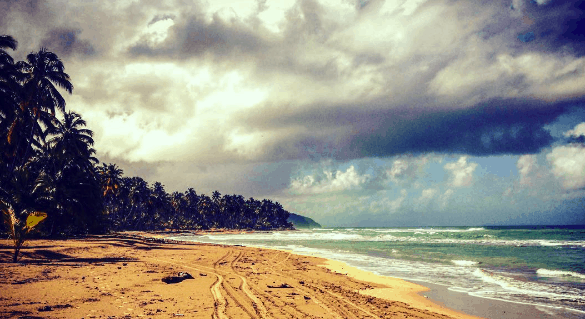5 Problems With Beach Cities Around the World
I’m a sucker for crystal clear waters, smooth waves, white sand, and strong sun rays. Beach cities have always been a draw for me.
Once I began traveling, I always made plans to spend some time at the beach. I made sure to plan one week to one month in the water – no matter where I was.
I’ve even considered pulling the trigger and basing up in a beach city like Cartagena, Colombia or San Juan, Puerto Rico for a few months at a time.
The draw of beaches, warm weather, fun nightlife, and a decent population is strong. That’s a pretty tough combination to match. Yet, I never pull the trigger…
I always end up basing up in the major cities with a lot of hustle and bustle. For a while, I’d regret not living the beach life. I’d regret not residing in a lovely apartment within 5-minutes walking of the waves.
Then I’d snap back to reality. I’d reflect on my past experiences. I’ve yet to find any of the beach cities I’ve visited live up to the hype.
While beach cities can be picture perfect on a postcard or Instagram post, the reality of life in these tourist traps is never that glamorous.
5 Problems With Beach Cities Around the World
Why do I prefer big cities with below-average levels of tourism? Why do I avoid tourist traps and towns by the beach like it’s the plague?
Well, there’s many reasons why. Mainly, tourist traps just aren’t that enjoyable to live in.
And beach cities? They tend to be the biggest tourist traps of them all. Fun for a week or two. Annoying for a few months. Here’s why:
Dollar Signs
Maybe you’ve had a different experience. Maybe I’m sensitive. But I’m willing to bet anyone who has spent time in a tourist trap city knows the feeling. Locals look at you like dollar signs
You’re not a person to them. You’re only USD. The almighty dollar. They don’t give a shit about anything except getting USD out of your pockets and into theirs.
Now, I know we’ve been blessed. If you’re reading this, there’s a high chance you’re from the Western world. And this is a huge blessing. But…
Trying to find real, authentic, and intelligent people to interact with in tourist trap cities is damn near impossible.
Just think how many times someone you’ve never spoken to in your life calls you “My Friend!” when walking around in a Latin American beach town.
For example, I was just in Cartagena, Colombia. The city is stunning. You have high-rise apartments on the beach, a charming colonial old city, and crystal clear white sand beaches just a few minutes from all the action.
On paper, Cartagena would be an ideal spot to base up and spend a month or two. But I’m fairly certain I’d pass on that.
You can’t relax on the beach, as every 1-2 minutes a vendor walks by hassling you. The old city is packed with vendors and prostitutes, and I’m not sure which group is worse.

You negotiate a price to check out one of the tourist spots and hop on a boat. Then they try to upsell you on the ride over when you have no other options. Straight scammers.
For a week or so, these things aren’t huge deals. You learn to get over them. Cartagena is an absolute blast for a few days to a week.
Over the course of a month or two, these type of “minor” inconveniences just wear you down. You start to snap at the smallest things.
Now, compare the hassles above to life in Bogota, Colombia. There’s not a huge tourist industry here.
Most businesses and individuals make their money from other Colombians. Gringos and foreigners aren’t the main source of income for the vast majority of people here.
As such, people don’t look at you like dollars signs. If you speak a little Spanish, the vast majority of people here will treat you fairly. You won’t run into many scammers in the capital of Colombia.
Tourists Galore
You won’t find many tourists in cities like:
- Managua, Nicaragua
- Santiago de los Caballeros, Dominican Republic
- Cali, Colombia
As such, you’ll find yourself interacting with more locals than tourists. This allows you to understand the local culture a little better and practice your language skills.
As corny as it sounds, you’ll have a more “authentic” travel experience in these places.
When you travel to a tourist trap, often a beach city, you’ll find yourself interacting more and more with other tourists.
These other foreigners speak your language. They understand where you are coming from. Frankly, it’s just easier to talk to other travelers.
While this isn’t necessarily a bad thing, it’s not great, either. Why travel half-way around the world to speak with people who are just like your friends and family back home?
Prostitution Rampant
Here’s the truth. Sex tourism is rampant in beach cities around the world for both sexes.
When I stayed in Las Terrenas, Dominican Republic – my friends and I rented a nice three-bedroom apartment with a beach view on the outskirts of town.
We’d spent a ton of time in the DR. Santo Domingo, Santiago, Punta Cana, and more. We thought we knew the culture. Boy, we were wrong.
We had two neighbors on the same floor. One was a middle-aged French lady. The other was an older Italian guy.
Every other night they both had a new member of the opposite sex come back to their place. Gifts and/or cash was always exchanged.
I’m no fan of prostitution, so this wasn’t a pleasant site. My friends and I all lamented how the culture of sex tourism had nearly ruined what could be one of the most beautiful beach towns in all the world.
Cartagena, Colombia is similar. A quick swipe on Tinder and every guy will be matching girls he’d only dream of. Within two messages, these stunners will be talking about money. Just the way it is.
Lack of Infrastructure
Many tourists only visit a beach city for a week or two. Then they never come back. People running businesses in the city know this. They’re looking for new customers.
The business model is to get as many people in the door as possible. Customer service and quality of infrastructure is often an afterthought in many beach towns.
That picturesque Airbnb apartment rental you paid near “luxury” prices for? Yeah, the pool and gym, both advertised online, aren’t working while you’re in town.
The fast Internet you were promised? A mobile router that your host forgot to recharge. It’ll run out in a few days. Then it’ll take that fantastic landlord of yours a few days to recharge it for you.
The “luxury” building you’re staying in? The elevator may go out for your whole stay. If you’re lucky, it’ll free-fall a few floors while you’re in it before getting stuck with no exit. That’s a personal story.
The first few times I had infrastructure issues at the beach I figured it was my fault. I was trying to find budget rentals, so clearly they may not have the amenities I was used to.
Then my budget grew a bit. Instead of spending $23 a night for an Airbnb studio five minutes walking from the beach, I was renting luxury apartments on the beach with buddies for $100-225 a night.
In countries like Colombia or the Dominican Republic, that’s fairly pricey. You expect to get at least a dedicated router and A/C that works when paying decent money for spots in “third-world” countries.
Often, you won’t, especially in tourist traps and beach cities. If you’re a digital nomad looking to work and enjoy the beach at the same time, it can be exceedingly difficult in these locales.
Weather Issues
In many beach towns around the world, the time you arrive will play a big role in the experience. A few days or clouds and rain can nearly destroy a short trip.
For example, I checked out a few beach towns in Peru and Ecuador. I had high hopes for places like Montanita and Mancora.
Sadly, these fell short. Instead of enjoying picturesque Pacific Ocean beaches and surf, it was cloudy my whole week between these two locales. I barely saw the sun. The waves weren’t any good, either.

While I had to take some blame for this, as I didn’t check the weather, that’s just the reality of living at the beach. There are a lot of factors out of your control.
Sure, certain beach towns have near ideal weather year around. Most don’t. You need to be diligent of planning your travels around cloudy days, rainy season, and more.
If not, you may arrive in Paradise to find out the crystal clear water you were expecting is quite brown. You may find out that nice tan you hoped to get isn’t happening, as you won’t see much of the sun for your whole trip.
Understanding the Realities of Beach Towns & Cites
I hope this piece wasn’t too much of a downer. While I’ve had some crummy experiences in beach cities, I’ve also had some amazing times.
I spent a week in San Juan del Sur, Nicaragua and everything worked perfectly. I made a ton of friends, surfed all day and partied all night. It was fantastic.
Before you plan to base up at a beach city, make sure you know what you’re getting yourself into. Do your research. Confirm the place you’re renting will offer everything you need.
Or enjoy a week of vacation at the beach after basing up in the big city. For many digital nomads and travelers, this combination seems to be a winning one.


